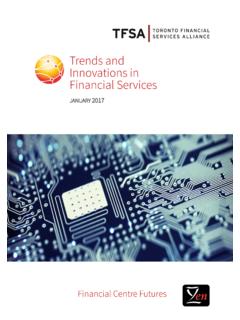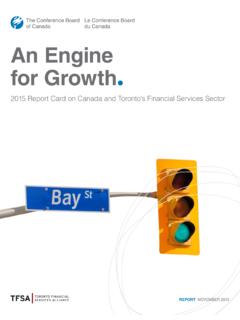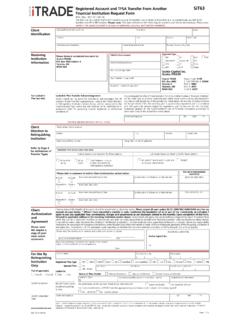Transcription of Unlocking the human opportunity Future-proof ... - …
1 A study between Toronto Financial Services Alliance and PwC Canada bringing together insights across the Toronto financial services 2018 Unlocking the human opportunityFuture-proof skills to move financial services forward 2 Unlocking the human opportunity : Future-proof skills to move financial services forwardPrefaceTo that end, one of our key talent objectives is to contribute relevant data to inform the talent strategies of our members. Recognizing that there are a number of well-established and credible human capital surveys available to FS employers, this year we sought to identify and fill a talent data gap. Specifically, we polled our members to understand the critical information they struggled to find that would help drive their businesses resounding response pointed to a lack of information on skills required to be successful in the future.
2 With the technology and business landscapes changing so rapidly, FS employers are finding it difficult to plan and prepare for the future. What skills will be needed by FS workforces over the next three to five years and beyond? And how can we start preparing our employees and business leaders for success today? Toronto Financial Services Alliance (TFSA) is a not-for-profit organization established by and working on behalf of government, Financial Services (FS) employers and academia to drive the competitiveness and growth of Toronto s FS sector and establish its prominence as a leading international centre. An integral part of TFSA s mandate is to support the attraction, development and retention of world-class, in-demand talent for the FS there is a myriad of big picture research dedicated to the topic of workforce of the future , none of it offers the level of specificity that our members , we have intentionally framed our research to offer a more detailed view of how roles and skills will change.
3 This research is specific to financial services, with an emphasis on the Toronto region. We consider significant influencers of change and how they will affect five key operational areas common to FS organizations throughout our sector. Our findings are based on the views and input of executives leading the five operational areas of focus, specialists in emerging technologies, and subject matter experts in global financial services, as well as a breadth of secondary research. The result is a roadmap that forges a path forward to prepare FS organizations and employees for the future. We hope that the trends, themes, findings, and recommendations found in the following pages will start a conversation within FS organizations and across the sector, to enable employees and businesses to unlock the human opportunity and continue their success into the future.
4 We would like to thank our members and our dedicated steering committee for your time and expertise. We are grateful for your insights, which have strengthened the quality and robustness of this report. And we appreciate your enthusiastic participation in the research, which confirmed for us that this was a timely and relevant initiative to undertake on your behalf. Sashya D SouzaSenior Vice President, Talent InitiativesToronto Financial Services AllianceTable of contents04 Executive summary06 Introduction08 Key trends influencing the future of financial services 08 Changing demographics and customer preferences 08 Increasing non-traditional competition 09 Managing the significant regulatory burden 09 Technology and big data 09 The speed of technology change10 Innovative technologies are reshaping financial services 10 Robotic process automation 10 Artificial intelligence 11 Internet of things 11 Blockchain12 The human opportunity14 Skills to Future-proof your talent 14 human experience skills 14 Reimagination skills 15 Pivoting skills
5 15 Future currency skills digital and data acumen16 New roles are emerging 16 Data science and analytics roles 17 How Agile is changing roles18 Impact across business areas 18 Customer service and sales 20 Product development 22 Technology 24 Operations 26 Control functions28 Actions employers can take 29 Phase 1: Assess 30 Phase 2: Attract and retain 32 Phase 3: Develop 33 Phase 4: Evaluate and reward 34 Phase 5: Transition36 Summary37 Appendix38 Acknowledgements39 References 39 Endnotes 41 Bibliography43 Contacts34 Unlocking the human opportunity : Future-proof skills to move financial services forwardIt s how youmake me feelPlaying to thestrength of peopleSolving important problemsBoth sidesof the T Thriving inconstant fluxHuman experience skillsReimagination skillsPivoting skills Future currency skills digital and data acumenExecutive summaryThe availability of key skills is one of the top concerns of CEOs around the In Canada, 30% of CEOs in banking and capital markets and 29% of CEOs in asset and wealth management believe the availability of key skills is a major threat to their growth prospects.
6 Given that Toronto is the second largest financial centre in North America, employing over 800,000 people2, it is critical for companies in the financial services (FS) sector in Toronto to ensure they have the right people and skills to succeed in the future. To do this, financial institutions (FIs) need to understand the key trends shaping the financial services sector, how trends are changing the nature of work, and the impact any changes will have on the demand for specific skill sets. This report seeks to build a better understanding across each of these areas in an effort to provide business leaders with insights and practical recommendations to move their organizations forward, while also giving people looking to enter the sector a view into areas of opportunity and the critical skills they need to did we do?
7 This report is based on insights gathered through consultations and surveys with over 80 executives across the FS sector in Toronto, a review of a wide range of secondary research, and a synthesis of the deep expertise and knowledge of subject matter experts in financial services, people and organization, and technology from across PwC s global network. How are the demands on people changing in financial services?Toronto FS executives highlighted a number of global trends exerting significant pressure on their businesses. These included changing demographics, shifting customer preferences, and the changing financial services landscape including increased sector participation from large technology players such as 5 Alipay, Amazon, and Google.
8 Big data, the rapid evolution of technology, and the speed of change were also consistently highlighted as major drivers of investment in emerging technologies and the shift to new business models. Most executives agreed that embracing change is the only way to remain competitive given the myriad of challenges affecting the of these trends is having an impact on the nature of work, the demands on people, and the skills employees need to be successful. As the financial services sector continues to change, so will the demands on people and their skills. Our report explores this evolution across the five key themes that emerged from the research. 1. It s how you make me feelIt is experiences that matter for both customers and employees.
9 Customer expectations are changing rapidly and are being shaped by their experiences with organizations outside of financial services. Employees are also looking for greater purpose and more meaningful work. This is putting pressure on FIs to deliver a first-rate people experience for both their customers and employees. 2. Playing to the strength of people Increased automation of repeatable, routine, rule-based tasks is expected to create capacity for more value-added work. This shift in focus will require more humanistic skills, such as critical thinking, empathy, and creativity. FIs will need to promote an environment that supports continuous improvement, innovation, and talent development. 3. Solving important problemsGreater focus on problem solving is expected to help FIs meet the true needs of people in the future.
10 In the customer context, this means understanding the holistic customer to deliver relevant solutions to complex problems. For employees, it means bringing together diverse skill sets and perspectives in multi-functional teams ( Agile) to find new approaches to solving problems across Both sides of the T The T refers to the breadth and depth of skills and expertise. When considering breadth of skills, there are core Future-proof skills that all people should focus on acquiring. We describe these Future-proof skills below; however, both breadth and depth of skills will be critical moving forward. Individuals in business roles will need to know enough about technology to change the way they solve problems, while individuals in technology roles will need greater business acumen in addition to being specialists in their fields, and customer-facing roles will require strong human experience skills and deeper technical skills to meet customer needs.










